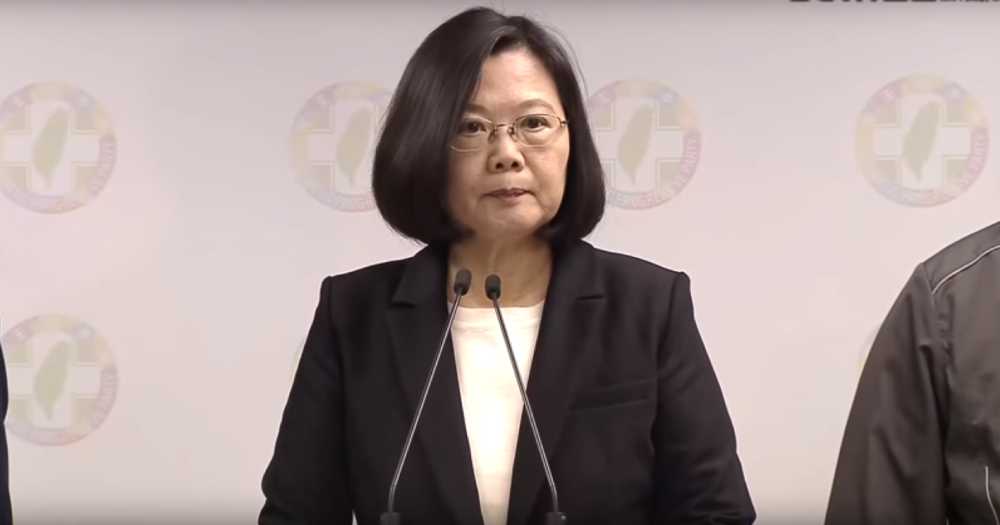Taiwan's ruling Democratic Progressive Party (DPP) suffered a major electoral setback on Saturday's (Nov. 24) local elections, losing seven of the 13 cities and counties it won in 2014.
Of its losses, the southern city of Kaohsiung is probably the one that stung the most. This is because for the first time in 20 years, the DPP lost its traditional stronghold to the Kuomintang (KMT).
The pro-independence DPP has also lost Taichung, which is Taiwan's second-largest city.
To take responsibility for the defeats, Taiwan's President Tsai Ing-wen said at a press conference she is quitting as DPP's chair:
"Our efforts weren't enough and we let down all our supporters who fought hard with us.
I hereby present our most sincere apologies.
Today, democracy has taught us a lesson. We must continue to study and accept the higher expectations of the people."
DPP's loss similar to KMT's defeat four years ago
Sun Da-chien, a finance law professor at CTBS Business School in Tainan who used to be a KMT legislator, told the South China Morning Post (SCMP) that the KMT's victory is not really because of the KMT itself:
"The KMT should not entertain the thought that it is the actual winner of the election.
Rather, it won because voters were disappointed with the DPP and Tsai's performance."
The situation is similar to the last nine-in-one local elections in Taiwan back in November 2014, when voters, unhappy that the KMT was getting too close to China and disillusioned with its performance on the economy, gave a clear vote of non-confidence to the Ma Ying-jeou administration.
The KMT suffered a landslide defeat then, losing eight of its 14 municipalities and counties.
It set the stage for the 2016 presidential election, which saw the DPP win a sweeping victory, displacing the KMT.
Why are voters unhappy with the DPP?
Wang Kung-yi, a political science professor at Chinese Culture University in Taipei, told SCMP that the election result is an indication that the Taiwanese people are "strongly dissatisfied" with Tsai's performance:
"[They] used their ballots to teach her a lesson."
Tsai's party has faced increasing backlash over several issues:
1. China policy
Voters were concerned with cross-strait relations, which has deteriorated ever since Tsai took office.
Tsai had failed to affirm the 1992 Consensus, which is the tacit agreement between Beijing and Taipei that there is only one China, although there were differing interpretations of what that means.
Consequently, Beijing has cut off formal communication with Taiwan and increased its pressure on Taiwan internationally, convincing businesses to list Taiwan as part of China on their websites and increasing Taiwan's diplomatic isolation.
It also stepped up military exercises around Taiwan, sending a powerful signal to pro-independence activists.
Whether or not to use "Taiwan" instead of "Chinese Taipei" at the Olympics was also one of the key referendum issues that voters had to decide on at the polls, although the International Olympic Committee has already made it clear it would not approve any change to its name as per a 1981 agreement.
However, Tsai has stopped short of calling for independence, angering pro-independence Taiwanese who thought her stance was not radical enough.
Her middle approach can be said to have provoked both sides of the political spectrum and the results indicate the failure of that middle ground.
2. Taiwan's flailing economy & Tsai's failure to fulfill election promises
However, the DPP's loss has more to do with the failure of its domestic policies, and should not necessarily be taken as a rejection of its China policy, according to the Financial Times.
Taiwan's economy under Tsai has remained sluggish, despite her promise to revive it.
According to AFP, although Taiwan's GDP is growing, some voters say they have not benefited as their salaries remain stagnant while the cost of living rises.
Even some grassroots groups that traditionally support the DPP blame worsening cross-strait relations for affecting their livelihoods.
In addition, Tsai's pension and labour reforms have not been well received by the public.
The issue of same-sex marriage was also a sticking point in the election.
Taiwan became the first in Asia to legalise same-sex marriage in May 2017, and the court has set a two-year deadline for legalisation.
But facing opposition from anti-gay marriage groups, Tsai's government has made little headway on the issue, despite campaigning on a promise of marriage equality before the 2016 elections, according to Reuters.
Top image via SETN
Content that keeps Mothership.sg going
???
Here are things S’pore’s public transport workers wish you knew.
??
Are you smarter than a 5th grader Smart Ah Ma?
??
Get arty and impress your date/boss/future mother in law without breaking the bank.
???
This 89-year-old uncle once wandered from Choa Chu Kang to Bedok.
??
"It does not matter how slowly you run, as long as your instagram shots look nice", right?
If you like what you read, follow us on Facebook, Instagram, Twitter and Telegram to get the latest updates.
